

Cannabis. What are the effects of drugs?
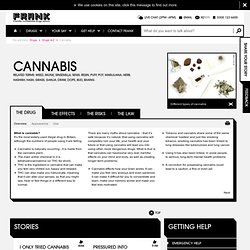
All drugs carry risks and you never know how you’ll react to a drug so it’s a bit of a lottery. Drugs can be broadly divided into three categories based on their main effects. They may act solely as stimulants, as depressants or as hallucinogens (aka psychedelics). Quite a few drugs have mixed effects. Many show two effects at the same time, and can then be described either as stimulant hallucinogens (for example, ecstasy) or as depressant hallucinogens (for example, cannabis). 5249 people found this helpful. Release Calendar. Past and future editions of 'Statistics on Drug Misuse, England' Page 1 of 1 | 7 results Title: Statistics on Drug Misuse, England - 2008 Report Release date: 14 August 2008 at 0:00am Theme: Health and Social Care | Department: Health and Social Care Information Centre | Coverage: EnglandGeographic breakdown: Country | Designation: National Statistics.
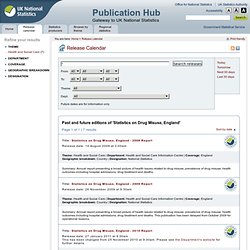
Marijuana Policy and Effects. Many opponents of medical marijuana make much of the purported link between marijuana use and mental illness.
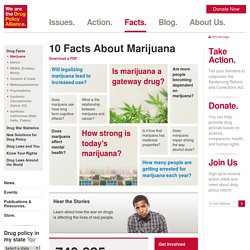
But there is simply no compelling evidence to support the claim that marijuana is a causal risk factor for developing a psychiatric disorder in otherwise healthy individuals. Most tellingly, population-level rates of schizophrenia or other psychiatric illnesses have remained flat even when marijuana use rates have increased. Emerging evidence indicates that patients who have tried marijuana may show significant improvements in symptoms and clinical outcomes (such as lower mortality rates and better cognitive functioning ) compared with those who have not.
In fact, some of the unique chemicals in marijuana, such as cannabidiol (CBD), seem to have anti-psychotic properties. Researchers are investigating marijuana as a possible source of future schizophrenia treatments; until it is legalized, however, this research is significantly impeded. National Study Shows "Gateway" Drugs Lead to Cocaine Use. The Center on Addiction and Substance Abuse at Columbia (CASA) released a study Oct. 27 showing that children (12 to 17 years old) who use gateway drugs--tobacco, alcohol and marijuana--are up to 266 times--and adults who use such drugs are up to 323 times--more likely to use cocaine than those who don't use any gateway drugs.
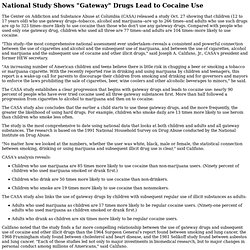
Compared with people who used only one gateway drug, children who used all three are 77 times--and adults are 104 times--more likely to use cocaine. "This study--the most comprehensive national assessment ever undertaken--reveals a consistent and powerful connection between the use of cigarettes and alcohol and the subsequent use of marijuana, and between the use of cigarettes, alcohol and marijuana and the subsequent use of cocaine and other illicit drugs," said Joseph A. Califano, Jr., CASA's president and former HEW secretary. The study is the most comprehensive to date using national data that looks at both children and adults and all gateway substances.
The Gateway theory. Some argue cannabis is a gateway drug – that its use causes people to also try, more dangerous drugs.
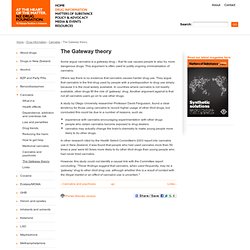
This argument is often used to justify ongoing criminalisation of cannabis. Others say there is no evidence that cannabis causes harder drug use. They argue that cannabis is the first drug used by people with a predisposition to drug use simply because it is the most widely available. In countries where cannabis is not readily available, other drugs fill the role of ‘gateway’ drug. Study: Marijuana may lead to other drugs. U.S. scientists say they don't believe the theory that experimentation with marijuana is harmless and won't lead to further drug use.
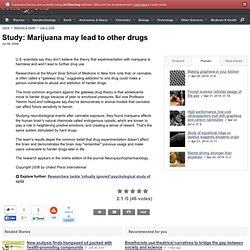
Researchers at the Mount Sinai School of Medicine in New York note that, or cannabis, is often called a "gateway drug," suggesting addiction to one drug could make a person vulnerable to abuse and addiction of harder drugs. The most common argument against the gateway drug theory is that adolescents move to harder drugs because of peer or emotional pressures. But now Professor Yasmin Hurd and colleagues say they've demonstrate in animal models that cannabis can affect future sensitivity to heroin. Studying neurobiological events after cannabis exposure, they found marijuana affects the human brain's natural chemicals called endogenous opioids, which are known to play a role in heightening positive emotions, and creating a sense of reward. That's the same system stimulated by hard drugs. Copyright 2006 by United Press International. Foundation for a Drug Free World: Marijuana as a Gateway Drug, Cocaine, Heroin, PCP.
Photo credits: Alamy Because a tolerance builds up, marijuana can lead users to consume stronger drugs to achieve the same high.
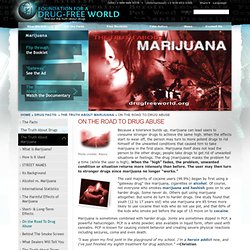
When the effects start to wear off, the person may turn to more potent drugs to rid himself of the unwanted conditions that caused him to take marijuana in the first place. Marijuana itself does not lead the person to the other drugs; people take drugs to get rid of unwanted situations or feelings. The drug (marijuana) masks the problem for a time (while the user is high). When the “high” fades, the problem, unwanted condition or situation returns more intensely than before. The vast majority of cocaine users (99.9%) began by first using a “gateway drug” like marijuana, cigarettes or alcohol. Marijuana is sometimes combined with harder drugs. "I was given my first joint in the playground of my school. Marijuana: Some Straight Answers.
What is marijuana?

Aren't there different kinds? Marijuana is a green, brown, or gray mixture of dried, shredded leaves, stems, seeds, and flowers of the hemp plant. You may hear marijuana called by street names such as pot, herb, weed, grass, boom, Mary Jane, gangster, or chronic. There are more than 200 slang terms for marijuana. Sinsemilla (sin-seh-me-yah; it’s a Spanish word), hashish (“hash” for short), and hash oil are stronger forms of marijuana. All forms of marijuana are mind-altering. Drugabuse. What is marijuana?
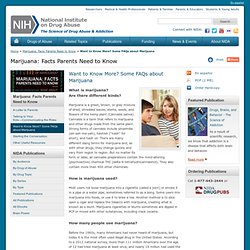
Are there different kinds? Marijuana is a green, brown, or gray mixture of dried, shredded leaves, stems, seeds, and flowers of the hemp plant (Cannabis sativa). Cannabis is a term that refers to marijuana and other drugs made from the same plant. Strong forms of cannabis include sinsemilla (sin-seh-me-yah), hashish (“hash” for short), and hash oil.